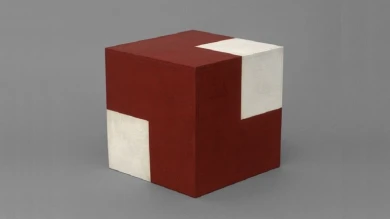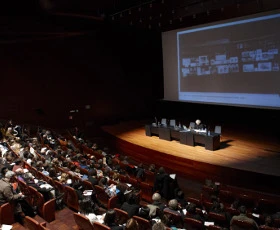-
July 11, 2013
Table 1: Encounters between Spain and Latin America
Moderated by: Jesús Carrillo
10:00 a.m.
Presentation
Paula Barreiro López, Jesús Carrillo, Fabiola Martínez Rodríguez and Gabriel Pérez Barreiro
10:30 – 11:10 a.m.
Keynote address
Olga Fernández López. Universidad Autónoma de Madrid
Notas sobre un relato migrante: vanguardias artísticas entre Latinoamérica y España
11:10 a.m. – 12:00 p.m.
Communications
Eamon McCarthy. Queens University, Belfast
Norah Borges: el arte de la negociación
Rodrigo Gutiérrez Viñuales. Universidad de Granada
La vanguardia oculta. Trayectos del diseño gráfico rioplatense (1920-1935)
12:00 – 12:30 p.m.
Break
12:30 – 2:00 p.m.
Communications
Irene Herner. Faculty of Political and Social Sciences, Universidad Nacional Autónoma de México, Mexico City
Siqueiros contra el fascismo y la guerra (1932-1939)
Joan Robledo-Palop. Yale University, New Haven
Frente a Frente y Nueva Cultura: narraciones transatlánticas de la violencia y el fascismo
Idoia Murga Castro. Universidad Autónoma de Madrid
Encuentros en escena: danza mexicana y exilio republicano
Miguel Cabañas Bravo. History Institute CCHS-CSIC, Madrid
Legados y esperanzas en los creadores españoles del exilio de 1939 en Cuba
2:00 – 3:30 p.m.
Lunch Break
3:30 – 5:00 p.m.
Communications
Ana María León. Massachusetts Institute of Technology, Cambridge
Antonio Bonet: el último indiano
Aitor Acilu and Juan Biain. Universidad de Navarra and Arantzazu Gaur Foundation
Jorge Oteiza. De San Agustín a Santiago. Miradas al origen: el pasado como amigo
Jennifer Josten. University of Pittsburgh
La migración de formas entre España y México: Mathias Goeritz y la difusión del arte abstracto en la posguerra
Imelda Ramírez. Universidad EAFIT, Medellín
Relatos de la escultura moderna en Colombia: Jorge Oteiza y Edgar Negret
5:00 – 5:30 p.m.
Break
5:30 – 6:40 p.m.
Communications
Ernesto Hernández Busto. Independent researcher
El sueño y la piedra: notas sobre João Cabral de Melo, Joan Miró, “Dau al Set” y la estética de la composición
María González Pendás. Columbia University, New York
Intercontinentes: ilusiones del exilio republicano en México a través de unas formas de hormigón
Fernando Herrero Matoses. University of Illinois at Urbana-Champaign
Alberto Greco y Julio Cortázar: el 'juego' y la trayectoria nómada de la vanguardia
6:40 – 8:00 p.m.
Responses to the communications and colloquium
-
July 12, 2013
Table 2: Modernity and Modernism(s): Displacement and Divergence
Moderated by: Paula Barreiro López.
9:00 – 9:40 a.m.
Keynote address
Michael Asbury. Research Centre for Transnational Art, Identity and Nation (TrAIN), University of the Arts, London
Contesting Notions of Hybridity in Brazilian Modern Art
9:40 – 11:10 a.m.
Communications
Lori Cole. Brandeis University, Waltham
¿Qué es la vanguardia? Ultraism Between Madrid and Buenos Aires
Mara Sánchez Llorens. Universidad Nebrija, Madrid
Cuando los límites del arte son invisibles. Cartografías universitarias latinoamericana
Kaira Cabañas. PhD. Princeton University
Modern and Mad: Ethics of Reception, Rio de Janeiro
Catrin Seefranz. University of the Arts, Zurich
Modernismo Pobre. The Emancipatory Practices of the “Avant-Garde in Bahia” in the 1950s
11:10 – 11:30 a.m.
Break
11:30 a.m. – 1:00 p.m.
Communications
Fabiola Martínez Rodríguez. Saint Louis University, Madrid
The Paradoxes of Modernism, and the Divided Legacies of Surrealism and Abstraction in Mexico
Cecilia Fajardo Hill. Independent art historian and curator, Los Angeles
Las ‘otras’ modernidades
María Iñigo Clavo. Spanish University of Distance Education and Universidade de São Paulo
Las preposiciones de la modernidad
Edith Wolfe. Tulane University, New Orleans
Latin America’s Discrepant Cosmopolitanisms and the Limits of Center and Periphery Models for understanding the Avant-Garde
1:00 – 2:00 p.m.
Responses to the communications and colloquium
2:00 – 3:30 p.m.
Lunch Break
-
July 12, 2013
Table 3: Museography, representation and curatorial narratives
Moderated by: María Dolores Jiménez-Blanco.
3:30 – 4:10 p.m.
Keynote address
Gabriel Pérez Barreiro. Patricia Phelps de Cisneros Collection Foundation
Algunos apuntes sobre exposiciones de arte 'latinoamericano': constelaciones, estrellas, temas y variaciones
4:10 – 5:40 p.m.
Communications
Dafne Cruz Porchini. Universidad Nacional Autónoma de México, Mexico City
La Exposición Internacional del Surrealismo en México (1940). Símbolo de un cambio de paradigmas
Aleca Le Blanc. Getty Research Institute, Los Angeles
Under Construction: Calder at Rio de Janeiro’s Museu de Art Moderna in 1959
Carmen Juliá. Tate, London
Julio Plaza y el arte postal: redes de intercambio transnacional
Gina Tarver. Texas State University, San Marcos
Espacios ambientales en el Museo de Arte Moderno de Bogotá: fomentando una neo-vanguardia internacional en Colombia
5:40 – 6:10 p.m.
Break
6:10 – 7:40 p.m.
Communications
Miriam Basilio. New York University
El canon latinamericano en desarrollo: exponiendo la colección en el Museo de Arte Moderno, 1945-1954
Blanca Serrano Ortiz de Solórzano. Institute of Fine Arts, New York University
La abstracción geométrica cubana: intercambios artísticos internacionales y políticas museológicas locales
Lucas Baden. Staatliche Hochschule für Gestaltung (HfG), Karlsruhe
'Vochito' contra 'Murales'- de 'Motor' a 'Promotor': Fernando Gamboa, la vanguardia del arte méxicano y la Bienal de Venecia
Francisco Godoy Universidad Autónoma de Madrid
El modelo constelar: Mari Carmen Ramírez y su estela
7:40 – 8:00 p.m.
Break
8:00 – 9:00 p.m.
Responses to the communications and colloquium -
July 13, 2013
Table 4: Genealogies and Discourses of the Avant-garde
Moderated by: Fabiola Martínez Rodríguez.
10:30 – 11:10 a.m.
Keynote address
Andrea Giunta. University of Texas, Austin
Transatlánticos / Transcontinentales. Una discusión sobre diálogos y genealogías
11:10 – 12:20 p.m.
Communications
Harper Montgomery. Hunter College, New York
The Critic and the Visionary Avant-garde, a Transnational Network
Manuel Gutiérrez Silva. Rice University, Houston
Vision and Distinction: Avant-garde Artwriting and the Deconstruction of Visual Culture in Post-revolutionary Mexico
Cecilia Braschi. University of Paris I, Panthéon-Sorbonne
La ‘síntesis de las artes’ en las revistas brasileñas de posguerra: herencias vanguardistas y postulados locales
12:20 – 12:40 p.m.
Break
12:40 – 2:00 p.m.
Communications
Daniela Lucena. Universidad de Buenos Aires, CONICET
Tensiones entre arte/política en la asociación arte concreto-invención
Paula Barreiro López. History Institute CCHS-CSIC, Madrid
Hacia la izquierda: el acomodo de una vanguardia “sans rivages” en el discurso estético marxista de los años sesenta
Jaime Vindel. Universidad de León
Conciencia ética y conciencia estética en la vanguardia argentina de los años sesenta. Una crítica del esteticismo de la teoría de la vanguardia posmarxista
2:00 – 4:00 p.m.
Lunch Break
4:00 – 5:10 p.m.
Communications
Mariola V. Alvarez. Rice University, Houston
Neoconcrete Books and the Politics of Participation
Ornela S. Barisone. Universidad Nacional de Rosario, National Board of Scientific and Technical Research, Institute of Latin American Literature, Universidad Autónoma de Entre Ríos
Discursos de la vanguardia e intercambios transnacionales ‘fuera de foco’: sobre el invencionismo y la propuesta integrativa de E. A. Vigo
Fernanda Nogueira. Universidade de São Paulo
La vanguardia más allá de la vanguardia. El caso del Poema/Processo en Brasil
5:10 – 5:30 p.m.
Break
5:30 p.m. – 6:40 p.m.
Communications
José Luis de la Nuez Universidad Carlos III, Madrid
La difusión de las neovanguardias en América Latina y su repercusión en la crítica
Eve Kalyva. Universidad de Buenos Aires
Unas reflexiones sobre la vanguardia después el arte conceptualMara Polgovsky Ezcurra. University of Cambridge
Materia política: Marcos Kurtycz, León Ferrari y el retorno de lo (sur)real
6:40 p.m. – 8:00 p.m.
Responses to the communications and colloquium
8:00 – 8:15 p.m.
Closing act
Transatlantic Encounters: Avant-garde Discourses in Spain and Latin America
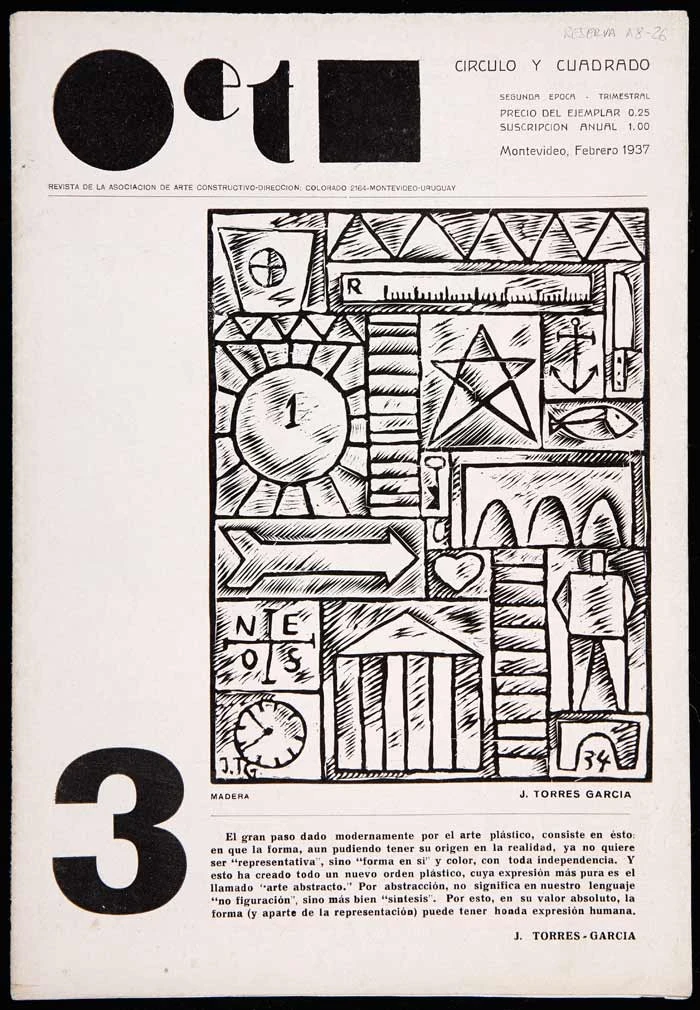
Held on 11, 12, 13 Jul 2013
This international event, which brings together researchers, artists and curators from both sides of the Atlantic, seeks to stimulate reflection about the notion of avant-garde in relation to the experience and discourse of modernity between 1920 and 1970.
The main object of this reflection is the political and aesthetic avant-garde that formed in the context of the first and second Avant-gardes (or Neo-avantgardes), and also the role that the exchanges between Spain and Latin America played in the construction of this notion. Through keynote addresses and communications, the various sessions will present the latest research, thus contributing to a better understanding of the relationships and exchanges between Spain and Latin America (which have been little studied to date), and to a reconsideration of historiography and the dominant discourses of modernism and modernity.
Organised by
CSIC History Institute (1), Saint Louis University Madrid, Patricia Phelps de Cisneros Collection and Museo Reina Sofía
(1) Supported by the National Plan for Research, Development and Innovation Project After the Republic: networks and two-way paths in Spanish art since 1931


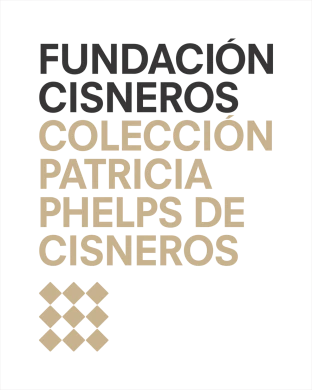
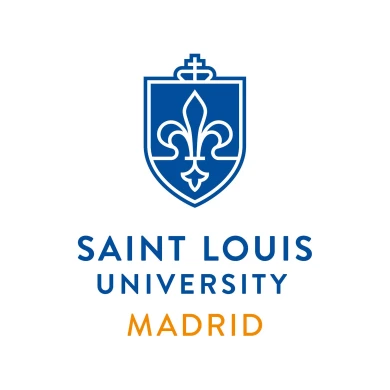
Participants
Scientific committee
Paula Barreiro López. History Institute at the Human and Social Sciences Centre, CSIC (Spanish National Research Council)
Fabiola Martínez Rodríguez. Saint Louis University, Madrid
Jesús María Carrillo Castillo. Museo Reina Sofía
Gabriel Pérez Barreiro. Patricia Phelps de Cisneros Collection Foundation
Más actividades

Difficulty. Forms and Political Effects of Deviation in Writing and Contemporary Art
23 February – 14 December 2026 – Check programme
Difficulty. Forms and Political Effects of Deviation in Writing and Contemporary Art is a study group aligned towards thinking about how certain contemporary artistic and cultural practices resist the referentiality that dominates the logics of production and the consumption of present-day art. At the centre of this proposal are the concepts of difficulty and deviation, under which it brings together any procedure capable of preventing artistic forms from being absorbed by a meaning that appears previous to and independent from its expression. By ensuring the perceptibility of their languages, difficulty invites us to think of meaning as the effect of a signifying tension; that is, as a productive and creative activity which, from the materiality of art objects, frees aesthetic experience from the representational mandate and those who participate in it from the passiveness associated with tasks of mimesis and decoding.
The economy of the referential norm translates the social logic of capitalism, where insidious forms of capturing subjectivity and meaning operate. In the early 1980s, and adopting a Marxist framework, poet Ron Silliman highlighted how this logic entailed separating language from any mark, gesture, script, form or syntax that might link it to the conditions of its production, rendering it fetichised (as if without a subject) and alienating its users in a use for which they are not responsible. This double dispossession encodes the political strategy of referential objectivity: with no subject and no trace of its own consistency, language is merely an object, that reality in which it disappears.
The political uses of referentiality, more sophisticated today than ever before, sustain the neoliberal-extractivist phase of capitalism that crosses through present-day societies politically, economically and aesthetically. Against them, fugitive artistic practices emerge which, drawing from Black and Queer studies and other subaltern critical positions, reject the objective limits of what exists, invent forms to name what lies outside what has already been named, and return to subjects the capacity to participate in processes of emission and interpretation.
Read from the standpoint of artistic work, the objective capture of referentiality may be called transparency. Viewed from a social contract that reproduces inequality in fixed identity positions, transparent in this objectivity are, precisely, the discourses that maintain the status quo of domination. Opposite the inferno of these discourses, this group aims to collectively explore, through deviant or fugitive works, the paradise of language that Monique Wittig encountered in the estranged practices of literature. For the political potency of difficulty — that is, its contribution to the utopia of a free language among equals — depends on making visible, first, its own deviations; from there, the norm that those deviations transgress; and finally, the narrowness of a norm which in no way exhausts the possibilities ofsaying, signifying, referring and producing a world.
From this denouncement of referential alienation, fetishisation and capture, Difficulty. Forms and Political Effects of Deviation in Writing and Contemporary Art turns its attention to the strategies of resistance deployed by contemporary artists and poets. Its interest is directed towards proposals as evidently difficult or evasive as those of Gertrude Stein, Lyn Hejinian, Theresa Hak Kyung Cha, Kameelah Janan Rasheed, Kathy Acker, María Salgado and Ricardo Carreira, and as seemingly simple as those of Fernanda Laguna, Felix Gonzalez Torres and Cecilia Vicuña, among other examples that can be added according to the desires and dynamics of the group.
The ten study group sessions, held between February and December, combine theoretical seminars, work with artworks from the Museo Reina Sofía’s Collections and exhibitions, reading workshops and public programs. All these formats serve as spaces of encounter to think commonly about certain problems of poetics — that is, certain political questions — of contemporary writing and art.
Difficulty. Forms and Political Effects of Deviation in Writing and Contemporary Art inaugurates the research line Goodbye, Representation, through which the Museo Reina Sofía’s Studies Directorship seeks to explore the emergence of contemporary artistic and cultural practices which move away from representation as a dominant aesthetic-political strategy and redirect their attention toward artistic languages that question the tendency to point, name and fix, advocating instead for fugitive aesthetics. Over its three-year duration, this research line materializes in study groups, seminars, screenings and other forms of public programming.

CLINIC 2628. A Community of Writing and Research in the Arts
February – October 2026
Clinic 2628 is a project which supports and brings together writings which stem from the intention to offer a space and sustainable time for research work in art and culture. Framed within an academic context which is increasingly less receptive to the forms in which thinking happens and is expressed, the aim is to rescue the academic from its neoliberal trappings and thus recover the alliance between precision and intuition, work and desire. A further goal is to return writing to a commons which makes this possible through the monitoring of processes and the collectivisation of ideas, stances, references and strategies.
The endeavour, rooted in a collaboration between the Museo Reina Sofía’s Studies Directorship and the Artea research group, via the i+D Experimenta project, is shaped by three annual editions conceived as spaces of experimentation, discussion and a demonstration of writings critical of what is put forward by today’s academia.
What forces, forms and processes are at play when writing about art and aesthetics? In academia, in museums and in other cultural institutions, the practice of writing is traversed by productivist logics which jeopardise rhythms of research and experimentation. The imposition of both scientism inherent in the structure of “the paper” and the quantifying of results which demand a criterion of quality and visibility sterilise and smoothen, from the outset, the coarseness that is particular to writing understood from the concrete part of language: phonic, graphic, syntactic and grammatical resistance connecting the language user to the community the language unites and activates. They also sterilise the roughness enmeshed in the same desire to write, the intuitive, clear and confusing pathways that once again connect the writer to those reading and writing, participating in a common good that is at once discovered and produced.
The progressive commercialisation of knowledge propelled by cognitive capitalism moves further away from the research and production of knowledge in artworks and artistic languages and practices. The work of curators and archive, criticism, performances and essays formerly saw a horizon of formal and emotional possibilities, of imagination that was much broader when not developed in circumstances of competition, indexing and impact. Today, would it be possible to regain, critically not nostalgically, these ways; namely, recovering by forms, and by written forms, the proximity between art thinking and its objects? How to write in another way, to another rhythm, with no more demands than those with which an artwork moves towards different ways of seeing, reading and being in the world?

Cultural Work
Thursday, 12 February 2026 – 5:30pm
This series is organised by equipoMotor, a group of teenagers, young people and older people who have participated in the Museo Reina Sofía’s previous community education projects, and is structured around four themed blocks that pivot on the monstrous.
Session number two looks to approach film as a place from which cultural work is made visible and processes of production engage in dialogue with artistic creation. From this premise, the session focuses on exploring how audiovisual content is produced, assembled and distributed, from the hands that handle the images to the bodies that participate in its circulation. The aim is to reflect on the invisible effort, precarity and forms of collaboration that uphold cultural life, that transform the filmic experience into an act that recognises and cares for common work.

Alberto Greco. Viva el arte vivo
Tuesday, 10 February 2026 – 7pm
In conjunction with the opening of the exhibition Alberto Greco. Viva el arte vivo, Fernando Davis, the show’s curator, and Amanda de la Garza, the Museo Reina Sofía’s deputy artist director, will converse in the Nouvel Building’s Auditorium 400 on the life and work of the Argentinian artist, a core figure in experimental avant-garde art.
The title of both exhibition and conversation originates from the proclamation “Long Live Arte Vivo” Alberto Greco (Buenos Aires, 1931— Barcelona, 1965) disseminated around the streets and on the walls of Rome. For Greco, arte vivo was an art of the future, an art based on a set of irreverent and untimely gestures, of adventures open to unpredictability melding with life, and which began in 1962, prior to his coining of the term “vivo-dito”. In his Manifiesto dito dell´arte vivo (Dito Arte-Vivo Manifesto), which he pasted on the walls of Genoa, Greco encouraged new contact “with the living elements of our reality: movement, time, people, conversations, smells, rumours, places, situations”. He would also burst into the everyday of Madrid’s streets as he convened a “vivo-dito moment”, culminating in the burning of a canvas painted collectively in Madrid’s Lavapiés neighbourhood.
In addition to founding arte vivo, Alberto Greco was an informalist painter, a queer flâneur, a poet and sometime actor. This intense journey of Greco’s life and art is closely connected to the migrant route he embarked upon in 1950 in Buenos Aires, taking in Atacama and Humahuaca, Paris, Rio de Janeiro, São Paulo, Genoa, Rome, Madrid, Piedralaves, New York and Ibiza and ending abruptly in Barcelona, where he took his own life shortly after writing his final great work, the novel Besos brujos (Bewitching Kisses, 1965).
These inaugural conversations, part of the main working strands of the Museo’s Public Programmes Area, aim to explore in greater depth the exhibition narratives of the shows organised by the Museo from the perspective of artists, curators and specialists.
![Basel Abbas y Ruanne Abou-Rahme, At Those Terrifying Frontiers Where the Existence and Disappearance of People Fade Into Each Other [En esas fronteras aterradoras donde la existencia y la desaparición de personas se disuelven entre sí], 2019](https://recursos.museoreinasofia.es/styles/small_landscape/public/Colecci%C3%B3n/abbasabourahme.png.webp)
Gaza and Aestheticide
Tuesday February 10, 2026 – 16:00 h
“This seminar examines the systematic destruction of Palestinian collective sensibility — what we might call ‛aestheticide’ — that has accompanied Israel’s genocide and ecocide in Gaza, and considers the conditions of artistic practice in its aftermath. Over more than two years, the demolition of universities, archives, museums, and libraries has not only erased cultural and intellectual infrastructure but has also targeted the very possibility of representation itself. The destruction of a people has been accompanied by the destruction of their image, their history, and their capacity to be known: reportage, scholarship, and cultural memory have been deliberately undermined, with media institutions, universities, and museums often complicit in this repression. Gaza consequently functions as a rehearsal space for a possible global future — of fascism, post-liberal authoritarianism, militarized borders, and AI-enabled warfare —, a laboratory for an emerging world order. What, then, becomes of critical analysis and resistance under these conditions? And what becomes of aesthetics and politics?”
—T.J. DemosThis seminar takes place thanks to the art historian’s invitation to Spain by the Miró Foundation. In the context of the museum, it engages in dialogue with a broader line of work on the climate emergency and decolonial perspectives developed within the Museum of the Commons project (2023–2026) of the L’Internationale network, of which the Museo Reina Sofía is a member; as well as with some of the questions that animate the study group Aesthetics of Peace and Desertion Tactics. Finally, it is also embedded in a wider strategy of support for and commitment to the artistic and discursive practices of Palestinian artists and cultural practitioners, most clearly reflected in the TEJA network.
